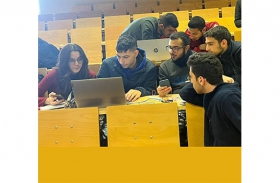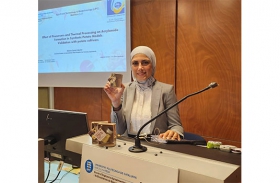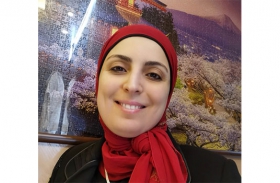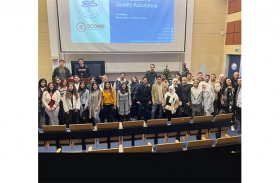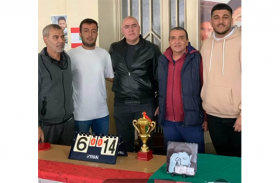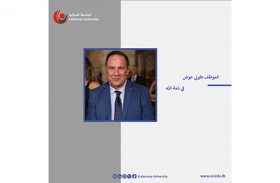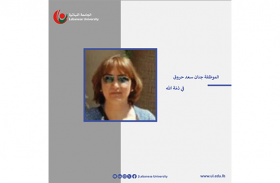
President Badran gives a speech at the Fouad Chehab CSC
The Lebanese Army's Fouad Chehab Command and Staff College welcomed President Bassam Badran, who gave a speech on "The Lebanese University - reality, challenges and future vision", in the presence of Brigadier General Mohamed Bitar.
Speech:
I feel honored and privileged to be part of this blessed group of commanders, who have pledged honor, sacrifice and loyalty to God and nation, and who have been true to their commitment. I thank those who gave me the opportunity to take part in this meeting, General Joseph Aoun and Brigadier General Mohammed Bitar. I salute all the officers present, to whom I would like to talk about the Lebanese University, its reality, its challenges and its future vision.
During my years of study at the Lebanese University, I experienced the joy of success and access to knowledge provided by competent professors. I also experienced the suffering of most of its students, especially those from the countryside or from the middle and lower classes. This is how I rose through the ranks as a professor and director of one of its laboratories, then as dean of one of its largest faculties, to the presidency I have the honor of assuming today.
I didn't mention these positions to boast, God forbid. The most important thing I've learned and teach my students is that advancement in any position must be accompanied by humility for the equation of strength and morality to be complete. I mentioned this to begin to describe the reality of the university in its simplicity as an integrated environment, made up of a student who seeks his future through it, a professor who works in his field in the best humanitarian professions, who transmit knowledge and contribute to its production, and a central university administration that manages all the work and activities of the university, which today has around seventy thousand students. Students, professors and employees are spread across several sites throughout the country.
The Lebanese University, the national reality and its repercussions
The Lebanese University is the nation's university, shining with its upscale civil face and natural location at equal distance from all its inhabitants and all Lebanese components. It seeks to establish human values in the souls of its citizens, far removed from the hateful legacies from which our country and society suffer. In order to paint a picture of the university reality and location, it is necessary to examine the geography of its spread and the antecedents of its expansion and inclusion in various Lebanese regions.
Since its creation in 1953, our university has faced major challenges. The most important of these has been to cope with the repercussions of internal wars, political and security instability, and the tremors that ravaged the nation, such as those that occurred in 1977. The university had to face these challenges with patience and determination, in order to preserve its existence, to continue and to move forward.
At the time, maintaining the unity of the university was the greatest challenge, given the difficult conditions afflicting our little homeland. The government issued Legislative Decree no. 122, dated 30/6/1977, which legalized the creation of branches in the governorates, without prejudice to the unity of the university in terms of central administration, programs, curriculum and budget. This enabled students to continue their courses in areas where they could not move freely from one region to another. After the end of the war, the branches became a need for social and academic development by excellence. Preserving, developing and expanding them became a national and moral duty. In this way, despite its expansion, the university won the challenge of its unity and centralized administration, and dedicated itself to a place of convergence and interaction between its professors and students from different regions.
This geographical expansion has gone hand in hand with the expansion of specializations, the modernization of programs, the development of teaching and its adaptation to the times through the use of the modern means available. This has made it a destination for students wishing to complete their higher education and obtain a certificate of which they are proud.
On December 26, 1967, Law No. 67/75 on the reorganization of the Lebanese University was promulgated, defining the university tasks, departments and administrative and financial organization. At the time, the number of university faculties was eight, and neither applied faculties nor doctoral schools were included. As the years went by and missions evolved, it was only natural that laws should modify certain articles and repeal others of the aforementioned law. Today, our university comprises 19 faculties and institutes covering a wide range of applied and theoretical specializations, grouped together on three major campuses in Hadath, Fanar and the North. In addition, a large number of buildings are rented or made available free of charge to the university in various regions. No other university in Lebanon can compare with ours, with its number of faculties and specializations, its scale of expansion and its large number of students, professors, researchers and employees.
The Lebanese University and the challenges faced
This panoramic view of the university, despite its beauty and the depth of its importance, has imposed great responsibilities on us, and haunts us daily with great pressures, which, despite their weight, do not weaken our determination and firm decision to defy the difficulties and face the repercussions of the unprecedented collapse our country is experiencing, so that we can resist, develop, modernize, and provide the best possible for our society, our homeland.
The first challenge is that we, as an official institution, fall into the "mill" of political tensions in their various dimensions, which has been the case for years until today without completing the administrative and academic structure of the university, as for the appointment of deans in due form, as they are all today assigned by the President of the university. At a time when Law No. 66 of 3/4/2009 stipulates that the university administration is ensured by a President and a Council, this does not exist today, not to mention the significant shortage of professors and employees, over half a million of whom are not authorized to work, and the vacancy of full-time professors. In addition, there are laws and regulations that no longer meet needs, are not compatible with the spirit of the times and require fundamental changes, such as Law No. 70/6, dated 02/23/1970.
All this leads to major complications that hamper our progress in dealing with basic administrative and academic issues, without which the work and daily life of the university and its inhabitants would not be possible, exposing our future ambitions and aspirations to avoidable delays and risks.
The major challenge we face is the scarcity of the budget, which has become similar to the Lebanese state budget in that, if issued, it is limited to a high percentage of over 80% on salaries. This situation has a negative impact on laboratory work, research, training and partnerships with higher education establishments in Lebanon and worldwide. It also contributes to the destruction of infrastructure, which is already in a state of disrepair. We would not be mistaken in saying that we are capable of properly maintaining the buildings, rectifying and repairing any defects, or replacing obsolete equipment with more advanced equipment. For example, the Rafic Hariri University Campus in Hadath, which cost around 250 million dollars to build over a surface area of one million square metres, is comparable to the best complexes in the world, and is attended daily by around 20,000 people, and contains residential buildings for 2,000 students. A sum of around 100,000 dollars has been allocated annually to this large square and its contents for its maintenance and operation, which is quite inadequate.
That's why we keep hearing protests about the breakdowns that occur here and there. We may not be able to solve them all, even with the modest means at our disposal.
The Lebanese University: optimism, success and vision for the future
The crises resulting from the political, economic and financial realities of the Lebanese state have prompted us to seek solutions outside the norm, and to do our utmost to remedy the financial shortage with new ideas aimed at transforming the university into a productive one, without affecting the level of high-level teaching or the ability to produce research. For our university to maintain its leadership, progress and presence locally and globally, it has achieved and continues to achieve top positions in international rankings, ahead of Lebanese and regional universities.
These visions and ambitions did not remain in the realm of dreams, but the process of transforming them into reality began with the following steps:
- Develop curricula and programs and focus them more on practical skills, particularly at master and PhD level, adapt education to modernity through the use of technology in the educational process, and strengthen the use of Internet in education.
- Promote scientific research, innovation and entry into labor markets through these gateways, and build partnerships with the world of industry and labor, both inside and outside Lebanon.
This is our vision for the present and future of the university.
Our university is endowed with scientific skills, including top-level researchers, academics, intellectuals, engineers, lawyers and doctors, enabling it to play a major role in the production process and to enter labor markets through its wide doors. The university has taken steps in this direction. For example, the partnership with Talal Abu Ghazaleh International Group to build an assembly plant for electronic and intelligent devices.
There's no secret about the great role the university played during the Covid-19 pandemic. Despite the great "scam" that swallowed up the university's financial rights, we will continue to look optimistically at the need to restore the university's financial rights with Middle East Airlines and other international companies. What has happened will not prevent us from remaining at the forefront of defending our people and our society from any health problems it may face.
The Lebanese University: A vision towards internationalism
The economic and financial collapse in Lebanon has had a serious and negative impact on the university's investment in scientific research. We are striving to overcome these repercussions and bridge this gap by broadening the horizons of cooperation with the developed world and engaging in various research programs, locally with the National Council for Scientific Research, and internationally by strengthening our international relations, building strategic partnerships and expanding them to include as many universities and research centers around the world as possible.
Dear officers,
Before concluding, I'd like to return to a subject that is particularly close to my heart, and I wouldn't say preoccupying, namely how to develop, encourage and extend relations between the Lebanese University and the Lebanese Army. I would like to emphasize here that we encourage university professors to pursue their academic activities at the Military Academy and the Army's Center for Research and Strategic Studies, and to strengthen our relations with the Staff College, where two master classes in military science have already graduated under an agreement signed with the university.
Dear friends,
Any structure is worthless if there are no arms to protect it.
Blessed be your weapons that defend the land, and blessed be the blood you have sacrificed for the homeland.
Glory and mercy to your martyrs.
Long live the Lebanese Army, long live the Lebanese University, long live Lebanon!
 LU Services
LU Services
 League of Retired Professors
League of Retired Professors
 News
News
 Vacancies
Vacancies
 International Relations
International Relations
 Contact Us
Contact Us
 Email
Email









 Download article
Download article
